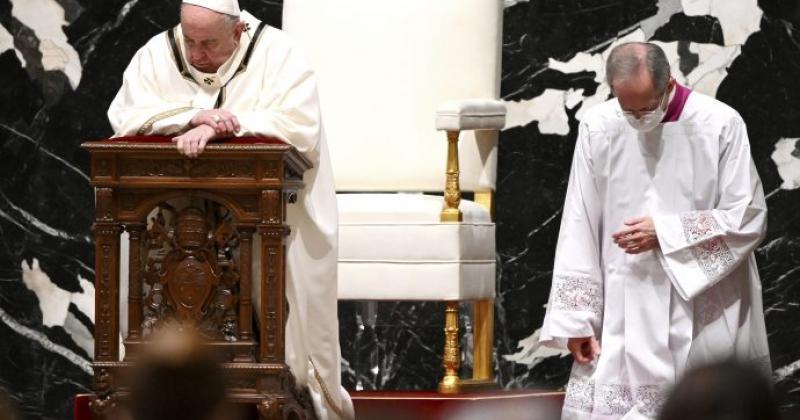Though he was not physically present for his New Year’s Eve liturgy due to what the Vatican has described as a “painful sciatica,” Pope Francis offered a message of hope for those searching for meaning at the end of a trying year marked by the COVID-19 coronavirus pandemic.
In a prepared text read aloud by Italian Cardinal Giovanni Battista Re, dean of the College of Cardinals, the pope said, “It might seem forced, almost jarring, to thank God at the end of a year like this, marked by the pandemic.”
His homily was delivered during the Dec. 31 recitation of Vespers in St. Peter’s Basilica, followed by a moment of Eucharistic adoration and the signing of the traditional Te Deum hymn of praise and thanks to God.
At the close of the year 2020, Francis said his thoughts were of families “who have lost one or more members, of those who have been sick, of those who have suffered from loneliness, of those who have lost their jobs.”
“Sometimes someone asks: what is the point of a drama like this?” he said, referring to the coronavirus pandemic, which as of Wednesday night had claimed 1,807,922 lives, with some 82,849,128 infections throughout the world.
In the face of such a jarring question, “We must not be in a hurry to answer,” Francis said, noting that “Not even God responds to our most distressing ‘whys’ by resorting to ‘higher reasons'."
Rather, “God’s answer follows the path of the incarnation,” the birth and death of his only Son for the salvation of mankind.
God is a shepherd, he said, asking, “which shepherd would give up even a single sheep, thinking that in the meantime he has many more left? No, this cynical and ruthless God does not exist. This is not the God whom we ‘praise’ and ‘proclaim Lord’” in the Te Deum hymn.
Francis then recalled the biblical parable of the Good Samaritan, who finds a man nearly beaten to death on the side of the road and, instead of passing him by, takes him to an inn and pays for his treatment.
In the parable, the Good Samaritan does not give the wounded man “a speech to explain the meaning of what happened to him, perhaps to convince him that it was basically for his own good.”
Instead, “the Samaritan, moved by compassion, bent over that stranger, treating him like a brother, and cared for him doing everything in his power.”
This story, Pope Francis said, can be a place where meaning is found amid the pandemic: “that of arousing compassion in us and provoking attitudes and gestures of closeness, care and solidarity.”
“This is what happened and is happening in Rome in recent months; and above all for this, tonight, we give thanks to God: for the good things that have taken place in our city during the lockdown and, in general, in the time of the pandemic, which unfortunately is still not over.”
Despite the loss of life and the massive economic fallout of the pandemic, there are many people “who, without making any noise, have tried to make the burden of the trial more bearable,” the pope said, adding, “the blessing and praise that God likes most is brotherly love.”
He pointed to the work carried out by doctors, nurses, volunteers, and healthcare workers throughout the pandemic, saying these are the people who are on the frontlines, and because of this, “they are always in our prayers and deserve our gratitude, as well as many priests and men and women religious.”
Francis also voiced thanks to those “who strive everyday to carry their family and their service to the common good forward in the best way possible,” and gave a special shout-out to school administrators and public officials who are “detached from private interests and also those of their party” and who, in his words, “truly seek the good of all starting from the most disadvantaged.”
“All this cannot happen without grace, without the mercy of God,” he said.
Noting that it is normal to think in terms of self-preservation when crises erupt, he questioned how it is possible, then, “that so many people, with no other reward than that of doing good, find the strength to worry about others?”
“What drives them to give up something of themselves, of their own comfort, of their time, of their possessions, to give to others?” he asked, explaining that, even if they are unaware of it, “the strength of God pushes them, which is more powerful than our egoisms.”
“For this we give praise to him, because we believe and know that all the good that is done on earth day by day in the end comes from him,” he said, adding that when looking to the future and the new year that awaits, “we again implore: May your mercy always be with us, in you we have hoped.”
Each year on the evening of Dec. 31 the pope celebrates New Year’s Eve Vespers in St. Peter’s Basilica to usher in the new year, and on New Year’s Day he celebrates a morning Mass for the solemnity of Mary, Mother of God.
This year the liturgies are being celebrated privately, with a limited number of faithful present, due to ongoing restrictions on public gatherings related to the coronavirus pandemic.
However, due to what the Vatican described as a “painful sciatica,” Pope Francis, who for decades has struggled with the condition, Thursday’s Vespers ceremony was presided over by Re.
Francis is also expected to skip Friday’s Mass for the solemnity of Mary, Mother of God, which will instead be celebrated by Vatican Secretary of State, Italian Cardinal Pietro Parolin.
However, Francis is expected to give his virtual Angelus address tomorrow at 12p.m. local time, which will be livestreamed from the library of the Vatican’s apostolic palace.
